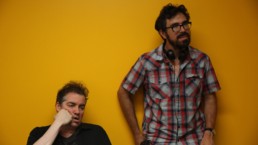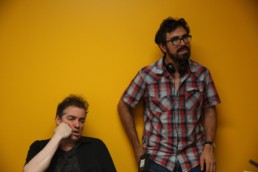Director Andrew Bujalski on ‘Results’
"Look – I'm still trying to figure out what my first film meant." - Andrew Bujalski
Just watch one of writer/director Andrew Bujalsk’s films, and you’ll see that not only does he welcome unconventionality in his filmmaking – but goes so far as to define himself by it. “There is that part of me that’s never going to go away that is proud when somebody points at me and calls me a weirdo,” the five-time feature film director notes over the phone while promoting his most recent film, Results (in theaters tomorrow). We had the chance to learn more about Bujalski, by way of talking about the success of his other most recent film, 2013’s ’80s docu-style festival hit Computer Chess, working with “professional” actors, and keeping it new in every film (“It’s not really worth doing if there isn’t some level of experimentation involved”). We begin:
When did you start shooting Results?
In June and July of last year, which is by far the fastest (turnaround). The fact that we’re talking about the movie on the eve of its release and we weren’t even shooting it a year ago, is mind-boggling to me.
What was it about Results that made the filmmaking process quicker than your previous films?
Well, necessity, in part.
The first movie (Funny Ha Ha, 2002) was finished relatively quickly, but the middle three I edited myself and really took my time, about a year and a half, which is the way I like working. It’s certainly not a very pragmatic way of doing things. This time around we were dealing with a little more money from slightly more conventional financiers – conventional in the sense that they were hoping for a return on their investment sooner rather than later. So there were business reasons to go a little bit faster.
In general, a lot of this movie was me experimenting with different ways of working. First and foremost, Can I survive working in a more “professional” mode? Part of that means turning the thing around faster. I did work with an editor this time (Robin Schwartz), which I had never done before. Also, my wife had our second child right at the end of our shoot, and I’m a slow enough editor as it is, but with an infant in the house, I would have been extremely slower.
This is you fifth film, and I think it’s interesting that you say you’re “still experimenting.” Is doing so part of your style as a director?
Every film is always a different experience. For me, it’s not really worth doing if there isn’t some level of experimentation involved, whatever that is. You can come at that a million different ways. That’s the scary part and the exciting part. Every time I get through one of these and survive it, and I think, “OK, maybe I got away with that, sort of,” I think about the crutch – the thing I was leaning on in that movie that made it OK and let me get away with the things I did…and what if I kick out that crutch, what’s left?
On this movie, I kicked out a lot of crutches. I am very comfortable working with non-professional actors, small crews, shooting on film, and all these things that may have been “bad for my career” were my comfort zone, and to go into this more “conventional” mode was like learning a new language for me.

Can you talk about the success of your previous film, Computer Chess?
I couldn’t have been more gratified at the reception that Computer Chess got. Going into that one, I had no idea what we were going to come out with and if anybody, anywhere, would be willing to screen it. For it to be as well received as it was was a great thrill.
What was the initial starting point with Results? Was there anything in particular that you wanted to explore in writing the film?
The first spark of it came from just sitting down and trying to get my head around what it would be like to work with professional actors. I figured if I was going to do something with more recognizable folks, then I had to build it differently. I first just started thinking of who I would want to work with, and obviously there are tons of great people out there, but the first two people that came to mind were Kevin Corrigan and Guy Pearce. I thought (Pearce) was such an interesting dude, and thinking about having Corrigan and Guy in the same movie was making me chuckle.
Ultimately, it was just throwing a lot of ideas at the wall and seeing what stuck, which is how I work on anything.
On this movie I kicked out a lot of crutches. I am very comfortable working with non-professional actors, small crews, shooting on film, and all these things that may have been “bad for my career” were my comfort zone and to go into this more conventional mode was like learning a new language for me.
I think it’s fantastic that you got both Corrigan and Pearce, whose characters clash so wonderfully onscreen. What did you learn from working with them?
Working with both professionals and non-professionals alike, you know they are not puppets, you can’t control them. You don’t want to control them. You want to sit back and be surprised by them, and that’s what makes it worth the headache of directing a movie.
I will say, the closest thing to an epiphany for me working with professionals is that I might have gone into it thinking they’ll be so on top of it there will be no insecurities. Then you realize the whole process of acting is all about insecurity. The whole process of directing is about communicating with people about their insecurities and yours. Insecurity is like the language of acting, and that was an interesting reveal for me.
Your directing style feels so unique, and I don’t say that lightly. It feels so specific to one person’s vision and comedic sensibilities. Where do you draw your comedic inspiration from?
That’s a great question. With specific regard to pop culture, it’s hard for me to say, because I feel so isolated from it. The funny thing is, it’s always a surprise to me every time. Every time I make something I get (caught up) in thinking everybody has my sense of humor. And then I read reviews.
Laughter
I feel like one of my earliest memories is being on the playground in elementary school and somebody called me weird, and I felt great pride – like I had accomplished something, and this was great news. I look back to that and think that pretty much explains everything since. Even though it gets harder as you get older, especially now, where it’d be great for me to make something that everybody did understand and love and made a billion dollars – I could use the billion dollars now with two kids, a mortgage, and all of these responsibilities – but there is that part of me that’s never going to go away that is proud when somebody points at me and calls me a weirdo.
Any last words that you’d like people to know about Results before checking it out?
We’ll see man, jury’s out. I’m so curious to see what the life of this movie is, not just opening weekend growth, but what it continues to be for me and people who see it and worked on it. It’s been a crazy ride for me, it did go really fast, but look– I’m still trying to figure out what my first film meant.
Ryan Rojas
Ryan is the editorial manager of Cinemacy, which he co-runs with his older sister, Morgan. Ryan is a member of the Hollywood Critics Association. Ryan's favorite films include 2001: A Space Odyssey, The Social Network, and The Master.



